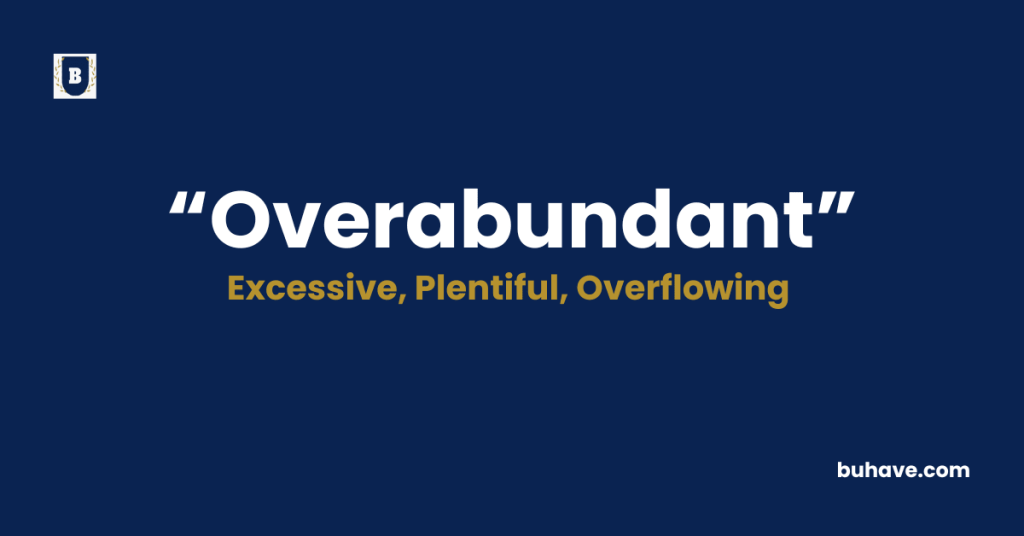The word ‘Overabundant’ (Adjective) describes something that exists in excessive or too great an amount, often to the point of being more than necessary or useful. In this guide, you’ll learn the full definition, synonyms, antonyms, etymology, and real-life examples of how to use ‘Overabundant’ correctly in sentences.
Overabundant Explained in Depth
A complete and detailed guide to the word Overabundant including meaning, definition, examples, etymology, synonyms, and antonyms.
Meanings of Overabundant
The word overabundant refers to something that is present in far greater quantities than are needed, wanted, or manageable. It often carries a slightly negative tone, implying that the excess might lead to waste, imbalance, or even discomfort. This word is typically used when discussing natural resources, emotions, data, opportunities, or even personality traits that appear too frequently or intensely.
For example, if a garden produces far more tomatoes than a family can consume, the harvest might be described as overabundant. Similarly, a person who gives constant advice without being asked could be said to offer overabundant opinions. While abundance is generally seen as a good thing, “overabundant” highlights that too much of something—even something positive—can become burdensome or unproductive. This term can help communicate when balance is missing and when too much of a good thing becomes a problem.
Definition
Overabundant is defined as an adjective that means more than sufficient; excessively plentiful; existing in a quantity so large that it becomes more than desirable or useful. It suggests that something goes beyond the level of abundance into a realm of excessiveness.
Unlike the word “abundant,” which implies a generous or ample amount that is generally welcomed or appreciated, “overabundant” takes this a step further—into the territory of surplus and potential waste or inefficiency. It can apply to tangible things like food, water, money, or intangible elements like attention, praise, or emotions. In environmental discussions, for example, an overabundant population of a species might upset the ecosystem’s balance. In interpersonal relationships, overabundant affection might feel overwhelming or smothering. The word is useful for articulating the fine line between plenty and too much—when the presence of something begins to have negative effects rather than positive ones.
Etymology
The word “overabundant” is formed from two distinct components in the English language that, when combined, clearly convey the idea of excess:
- Prefix: “over-” – Derived from Old English ofer, meaning “beyond,” “above,” or “excessive.” This prefix is commonly used to express excessiveness or exaggeration, as in words like “overdo,” “overeat,” and “overreact.”
- Root: “abundant” – This comes from the Latin abundantem, the present participle of abundare, meaning “to overflow” or “to be plentiful.” The root ab- means “from” or “away,” and unda means “wave,” which together give the sense of waves overflowing—an image of plentifulness.
Put together, “overabundant” literally means “excessively overflowing” or “too plentiful.” The term evolved in English by combining the positive notion of “abundance” with the modifying prefix “over-” to signal that the abundance has gone beyond what is reasonable or beneficial. This construction follows a typical English pattern of creating compound words that precisely describe variations in intensity or degree.
Example Sentences
- The overabundant rainfall this season caused widespread flooding across the valley.
- Her overabundant enthusiasm for the project sometimes overwhelmed her more reserved teammates.
- The forest was overabundant with deer, which began to affect the local vegetation negatively.
- We received an overabundant supply of materials, much more than the event actually required.
Overabundant Synonyms
- Excessive
- Superfluous
- Overflowing
- Redundant
- Overloaded
- Glutted
- Too much
- Surplus
- Overfull
- Teeming
Overabundant Antonyms
- Scarce
- Insufficient
- Limited
- Lacking
- Inadequate
- Sparse
- Deficient
- Minimal
- Short
- Rare
FAQs about Overabundant
Here are some frequently asked questions (FAQs) about the word “Overabundant”
1. What does “overabundant” mean in everyday language?
It means there’s too much of something more than is needed, useful, or even healthy in some cases.
2. Is “overabundant” a negative word?
Generally, yes. It suggests that an otherwise good thing has become excessive and possibly problematic.
3. Can you use “overabundant” for emotions?
Yes. You can describe feelings like love, fear, or anxiety as overabundant if they are experienced too intensely or frequently.
4. How is “overabundant” different from “abundant”?
“Abundant” implies a good amount—plenty but manageable. “Overabundant” implies too much, to the point of being undesirable.
5. Does overabundance always have a negative impact?
Not always, but it often leads to inefficiency, waste, or imbalance, depending on the context.
6. Can “overabundant” apply to digital content or information?
Yes. In the digital age, overabundant data or information can lead to overload and make it difficult to focus or decide.
Explore more O words
Positive words that start with O
Negative words that start with O
Names that start with O
Nouns that start with O
Verbs that start with O

















